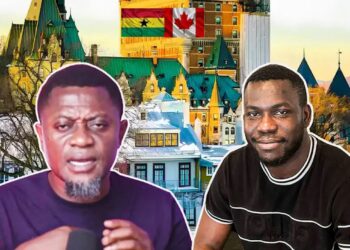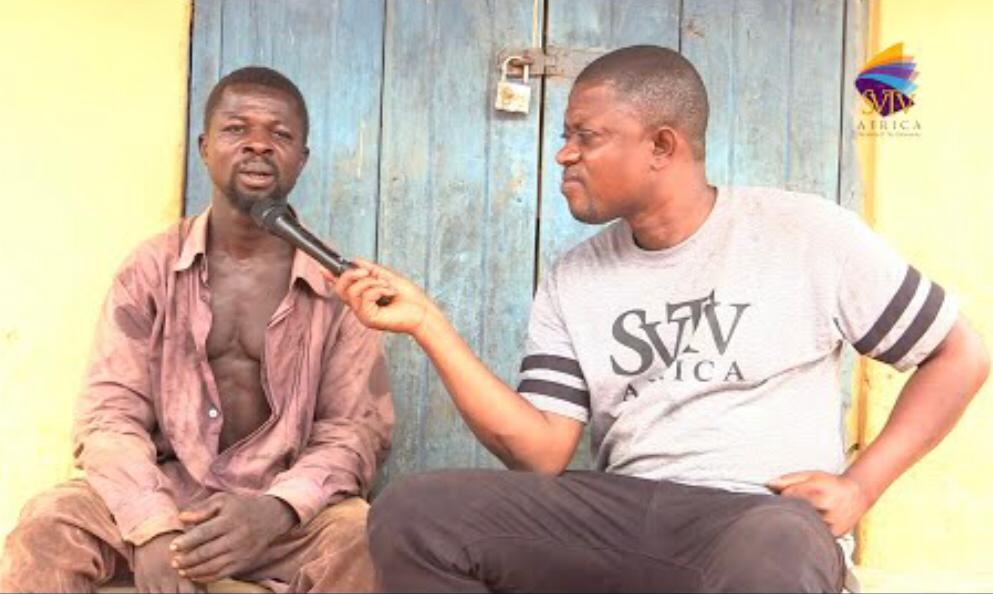Muhammed Munir, a Ghanaian currently based in Agyemang, UAE, previously lived in Abu Dhabi and has been in the Middle East for six years. Originally from Nsawam Adogyiri Zongo, he attended Roman School and later wrote his Form Four exams. He initially trained as a fitter mechanic but later stopped and started selling milk toffee and wagashi (fried cheese). However, the business was not profitable, so in 1998, he decided to travel in search of better opportunities.
His journey took him through the desert, crossing multiple countries: Accra, Togo, Benin, Niger (through River Gala), Algeria, and Libya. While in Libya, he started learning tailoring and worked in Sabha. His plan was to travel to Tripoliand then move forward, but he was arrested for using a fake Ghanaian passport. He was detained and beaten before eventually being released.
In an interview with DJ Nyaami on SVTV Africa’s Daily Hustle Worldwide, he revealed that after his release, he continued his journey and secured a job with a construction company. He worked hard, earned some money, and started planning his next move—to the USA. In the year 2000, he paid $1,200 for a connection to travel to Russia and then Jamaica, but he later decided to stay in Tripoli, where he lived for ten years.
While in Libya, he became well-known as a tailor and was respected by the local Arab community. His passport name was Yusif, and as his popularity grew, he became an agent for migrants traveling to Italy, helping others make their way to Lampadusa, Italy. In 2002, he planned to travel to Italy himself but was warned not to go. A day after he canceled his trip, the boat carrying other migrants sank, killing everyone except one survivor. After that experience, he decided to stay in Tripoli and continue working as an agent.
By 2005, he decided to return to Ghana. He shipped some items home but eventually went back to Libya to continue working. In 2008, he finally returned to Ghana, where he secured a job as a security guard under a direct employment contract with the U.S.. His contract lasted three years, after which he returned to Ghana in 2012 and got married.
Later, he ventured into gold mining in Dunkwa-Offinso, Kumasi, bringing foreign investors to Ghana. However, the government seized their excavators, forcing him to pause the business. He then resumed his tailoring work but eventually moved back to the UAE in 2018. He plans to return to Ghana between August and September to start a small business.
While living in Libya, he sent goods home for his family to sell, but they mismanaged the money. He also tried selling land, but his sister lost the funds he entrusted to her. Currently, he works as an agent, helping people relocate from Ghana to the UAE. He educates them on rules and regulations and advises them to start with a small stepping-stone job before aiming higher. However, many migrants ignore his advice and expect quick success, which leads to frustration.
He shared the story of a Ghanaian banker who moved to the UAE, started with a construction job, then completed a health and safety course, and eventually secured a government hospital job. However, housemaids and low-wage workers often struggle with accommodation. Some sleep outside because they cannot afford rent, while others share beds in crowded spaces.
Munir also spoke about the exploitation of women in the UAE. Some female migrants fall prey to men who take advantage of their financial struggles. He noted that although the UAE is an Arab country, parts of it resemble Europe, with massage parlors and other businesses catering to various nationalities, including Ugandans and Filipinos.
Regarding his future, he stated that he has never overstayed his visa and remains legally employed in the UAE. He understands the strict immigration rules, where overstayers are banned for six years. He expressed interest in moving to Europe, Canada, or the USA, but if that is not possible, he will stay in the UAE.
Reflecting on his journey, he emphasized that living abroad depends on personal choices—some people succeed, while others struggle. He believes that what doesn’t work for one person might work for another and that his years abroad have taught him valuable lessons.
Watch The Video Below:
















